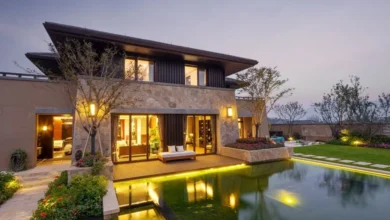How Modular Wall Panels Are Revolutionizing Commercial Interior Design

In the fast-evolving world of commercial architecture and design, flexibility, functionality, and aesthetics are no longer optional—they are essential. As businesses strive to create inspiring, adaptable, and efficient workspaces, one solution is quietly reshaping the design landscape: modular wall panels.
These innovative systems are redefining the way designers, architects, and facility managers approach interior environments. From their sleek visual appeal to unmatched adaptability, modular wall panels are truly revolutionizing commercial interior design.
What Are Modular Wall Panels?
Modular wall panels are prefabricated wall systems designed to be easily installed, removed, and reconfigured. Unlike traditional drywall or permanent construction methods, modular panels offer a non-permanent solution that retains structural integrity, visual sophistication, and utility.
Typically composed of aluminum or steel frames with interchangeable surfaces—ranging from glass and laminate to acoustic and fabric panels—these systems are tailored to suit the functional and aesthetic needs of various commercial spaces, including offices, hospitals, hotels, and retail environments.
Benefits of Modular Wall Panels in Commercial Design
1. Unmatched Flexibility and Adaptability
Today’s commercial spaces are in a constant state of evolution. Whether it’s accommodating hybrid work models, expanding teams, or adjusting layout for specific functions, adaptability is key. Modular wall panels can be reconfigured with minimal disruption, allowing businesses to reshape their space quickly without demolition or downtime.
This agility is particularly valuable in sectors like coworking, education, and healthcare, where requirements frequently change.
2. Time and Cost Efficiency
Construction delays and cost overruns are common in traditional interior build-outs. Modular wall systems drastically reduce both.
Because the panels are prefabricated, installation is significantly faster—sometimes up to 50% faster than traditional construction. There’s no need for mudding, sanding, or painting. Additionally, companies save on labor costs and avoid lost productivity due to long construction timelines.
In the long term, reusability means companies can avoid repeated build-out costs when layouts change.
3. Sustainability and Reduced Waste
Sustainability is no longer a luxury—it’s a requirement. Modular wall panels contribute significantly to greener building practices. Their reusable and recyclable materials reduce the carbon footprint associated with demolition and reconstruction.
In addition, many modular wall manufacturers use sustainable materials and offer LEED-compliant options, helping businesses meet their sustainability goals.
4. Acoustic Control and Privacy
Noise control is a top concern in open-plan offices and collaborative environments. Modular wall panels can incorporate sound-dampening cores, acoustic glass, and fabric coverings to absorb or block noise—enhancing privacy and concentration.
For environments like healthcare or financial institutions where confidentiality is critical, modular walls with acoustic insulation provide an ideal solution.
5. Aesthetic Versatility
Modern modular systems offer a high degree of customization. They come in various finishes, colors, textures, and configurations that align with branding and interior aesthetics. Want a glass wall with an etched logo? Or wood grain paneling that conveys warmth and professionalism? Modular panels can do it all.
By offering interchangeable skins or finishes, companies can update the look of their interiors with minimal investment and no structural change.
Applications Across Commercial Environments
Corporate Offices
In dynamic corporate settings, modular wall panels support agile work environments. They allow for quick creation of new offices, meeting rooms, huddle spaces, and private pods—all without disrupting daily operations.
Moreover, they enable businesses to scale up or down based on workforce needs and to maintain modern design continuity across floors and campuses.
Healthcare Facilities
Hospitals and clinics demand sterile, functional, and adaptable design. Modular wall panels meet those needs with antimicrobial surfaces, seamless construction, and easy reconfiguration for evolving treatment spaces. Panels can also be integrated with medical gas lines, IT cabling, or specialized equipment for patient care.
Retail Spaces
Retail is all about experience and branding. Modular wall panels help create high-end visual merchandising setups that can evolve with product lines or seasons. They can be used for display walls, fitting rooms, or partitions—and updated easily to reflect changing trends.
Educational Institutions
Schools, colleges, and training centers often need to shift between open collaboration areas and quiet study rooms. Modular wall panels enable rapid reconfiguration and ensure long-term adaptability as academic needs change.
Technology Integration and Smart Solutions
Today’s modular wall systems are more than just partitions—they’re technology enablers. Many offer integrated features such as:
- Built-in power and data routing
- Digital display mounting systems
- Smart glass that switches between transparent and opaque
- Touch-sensitive or writable surfaces
- Sensors for lighting and climate control
These innovations support the rise of smart offices and tech-enabled learning environments, streamlining operations while improving the user experience.
Challenges and Considerations
While the advantages are clear, businesses must weigh a few considerations before adopting modular wall panels:
- Initial Costs: Although long-term savings are significant, the upfront investment can be higher than traditional drywall.
- Design Limitations: Some complex architectural features may still require conventional construction.
- Structural Load: Not all modular panels are suitable for heavy-duty applications or high-impact zones.
Choosing the right supplier and ensuring proper planning are key to successful implementation.
The Future of Commercial Interiors
The commercial design industry is experiencing a paradigm shift. Gone are the days of static, one-size-fits-all spaces. In their place, modularity, sustainability, and human-centric design are taking center stage.
Modular wall panels sit at the heart of this movement, empowering businesses to create flexible, scalable, and beautiful interiors that reflect their brand and respond to change.
As hybrid work, digital transformation, and environmental consciousness continue to shape how spaces are used, modular solutions will only become more integral. Businesses that embrace this adaptability are better positioned to innovate and thrive—no matter what the future holds.
Final Thoughts
Modular wall panels aren’t just a design trend—they represent a fundamental change in how commercial spaces are conceived and constructed. They offer the adaptability that modern businesses crave, the sustainability the planet needs, and the elegance designers seek.
Whether you’re redesigning an office, launching a new healthcare wing, or transforming a retail space, modular wall panels provide a future-proof foundation for your vision.
If you’re considering a commercial interior upgrade, now is the time to think modular.




